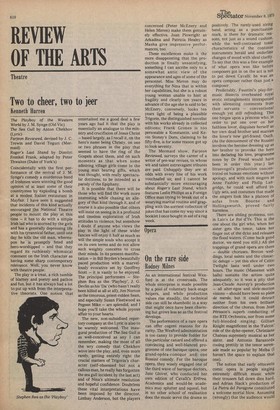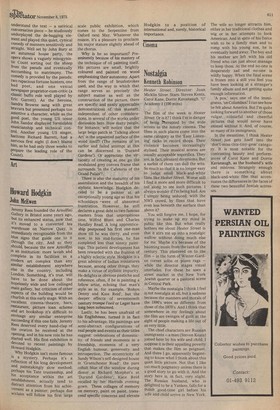Opera
On the rare side
Rodney Milnes
As an international festival Wexford is at the crossroads. The whole enterprise is made possible by a pool of voluntary back-stage helpers, and while production values rise steadily, the technical side can still be shambolic in a way that might once have been charming but grows less so as the festival develops.
The performance of a rare opera can offer cogent reasons for its rarity. The Wexford administration is too canny to provide fodder for this particular canard and offered a convincing and well-blanced programme of one baroque opera, one grand-opera-comique and one Rossini comedy. For the baroque opera, they wisely engaged one of the third wave of baroque doctors, Jane Glover, who conducted her own edition of Cavalli's Eritrea. Academics and would-be academics may splutter and squeal, but in no other school of realisation does the music serve the drama so positively. The rarely-used string band, acting as a punctuation mark, is there for dramatic reasons, not just as a sound cushiofl. while the well-contrasted tonal characteristics of the continuo instruments herald and underline changes of mood with ideal clarity To say that this was a fine example of what opera was like before composers got in on the act is not to put down Cavalli: he was an opera composer rather than just a composer.
Predictably, Faustini's play-formusic dissects overheated royal
erotic entanglements interspersed with alienating comments from their servants — conventional enough yet still refreshing. This one hinges upon a princess who, in order to put one over on her faithless lover, disguises herself as her own dead brother and marries the lover's new girl-friend. Ouch.
(As the denouement of the Rossini involves the heroine dressing up as her brother to provoke the hero into declaring his love, programme notes by Dr Freud would have been in order this year.) Ian
Strasvogel's production concen
trated on human emotions without apology, and with such singers as Anne Pashley and Philip Lan gridge, he could well afford to. Ugly sets, and costumes that made the singers look like a platoon of sofas from Bourne and Hollingsworth, proved fairly harmless.
There are sibling problems, too, in Lab's Le Roi d'Ys. This is the one about the girl who, when her sister gets the tenor, takes her finger out of the dyke and releases the flood waters. (Come back good doctor, we need you still.) All the trappings of grand opera are there — double choruses, Breton wed dings, local saints and the climactic deluge — yet this slice of Celtic Twilight lasts well under two hours. The music (Massenet with balls) sustains the action quite adequately, so it was a pity that Jean-Claude Auvray's production — all alter-egos and sloW-motion visions — should have been so plein de merde, but it could detract' neither from his own brilliant direction of the chorus, from Jean Perisson's superb conducting of the RTE Orchestra, nor from some full-blooded singing: Gillian Knight magnificent in the 'Falcon' role of the dyke-opener, Christiane Chateau supremely musical as her
sister, and Antonio Barasorda cooing prettily in the tenor serenade made so popular by Melba (I haven't the space to explain that one).
The notion that early ottocento comic opera is people singing extremely difficult music while their trousers fall down dies hard, and Adrian Slack's production of La Pietra del Paragone constituted a welcome mortal blow. Assuming (wrongly) that the audience would understand the text — a satirical conversation piece — he studiously underplayed the de-bagging element and played this quiet, cynical comedy of manners sensitively and straight. Well set by John Bury at an autumnal house party, the opera shows a vaguely misogynistic Count sorting out the sheep from the pseuds and eventually succumbing to matrimony. The. comedy is provided by the pseuds: two rapacious fortune hunters, one bad poet, and one venial newspaper proprietor-cum-critic (a Classic buffo role well played by Eric Garrett). As the heroine, Sandra Browne sang with great bravura but presented perhaps too assertive a character, while as the good poet, the young US tenor John Sandor displayed formidable musicianship and technical control. Another young US singer, baritone Richard Barrett, had a nervous first night (I don't blame him, as he had only three weeks to prepare the leading role of the Count).

































 Previous page
Previous page